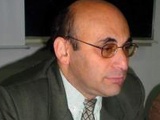|
|
TODAY.AZ / Politics
Azerbaijani political analyst: Blame for Armenia's absence in major int'l forums lies with country's authorities
09 February 2010 [11:58] - TODAY.AZ
Day.Az interview with Azerbaijani political analyst Arif Yunusov.
 How would you comment on Israeli FM Avigdor Lieberman’s upcoming visit to Azerbaijan?
How would you comment on Israeli FM Avigdor Lieberman’s upcoming visit to Azerbaijan?I welcome Israeli FM Avigdor Lieberman’s visit to Azerbaijan as well as growing Azerbaijani-Israeli cooperation. Given presence of certain problems in the Turkish-Israeli relations, the relations between Azerbaijan and Israel can contribute to improve relations between Ankara and Tel Aviv.
One of the U.S.-based Armenian Web sites accused Israel of complicity in "genocide" of Armenians of 1915, and previously pastor of St. Sarkis Church in Yerevan Priest Step Karapetyan stated that the conflict between the Armenian and Greek clergy, recurring in Jerusalem, was provoked by the Israeli authorities. How you can explain all of these explicit examples of highly negative attitude of world Armenians towards Israel?
The position of the State of Israel implies steps based on the understanding that it is surrounded by Muslim countries. In this connection, it is relevant to note that relations with Azerbaijan and Turkey are far more important for Israel than relations with Armenia.
Moreover, based on a purely pragmatic approach to this issue, relations with Armenia gives absolutely nothing to Israel, because Armenia does not play any major geopolitical or geo-economic role in our region. Israel develops relations with Azerbaijan based on its own national interests. Representatives of the world Armenians understand this and it makes them respond in the form of those examples that you have specified.
Who is to be blamed for the fact that Armenia is not invited to various major international forums and that it is not interesting to anyone as a partner with which bilateral relations can be developed?
Armenia has no role in the regional projects that already exist, it has no influence on the geo-economic situation in South Caucasus, and the level of its existing economic problems is well known. Therefore, it is not surprising that the country is not invited to such major forums such as the World Economic Forum in Davos.
The blame for this lies with the Armenian authorities whose policy has led to the fact that this country is not associated with an independent state. Naturally, in these circumstances one should not wonder at the lack of invitations for this de facto not independent state to any international forum and the reluctance to build relationship with it.
Is there a risk of power change in Armenia in the near future? Can Armenia’s position on the Armenian-Azerbaijani Nagorno-Karabakh conflict change in case of change of power in this country?
I do not think that Armenia’s incumbent President Serzh Sargsyan will be replaced before the end of his presidency. As for Armenia's position with a different president, it all depends on who will be the new head of the Armenian State: the representative of the current Armenian authorities and opposition representative, for example, Levon Ter-Petrosyan. In general, I doubt very much that Armenia's position on Nagorno-Karabakh conflict will change in the near future.
A. Hasanov
URL: http://www.today.az/news/politics/61167.html
 Print version
Print version
Views: 1607
Connect with us. Get latest news and updates.
See Also
- 23 August 2025 [11:23]
Valentina Matviyenko sends congratulatory letter to First VP Mehriban Aliyeva - 23 August 2025 [11:12]
Footage of President Ilham Aliyev’s visit to Turkmenistan posted on his social media [VIDEO] - 23 August 2025 [08:30]
Caspian neighbors unite: President Aliyev’s visit marks stronger ties - 17 August 2025 [15:58]
Diaspora groups push provocations as Baku-Yerevan relations slowly improve - 17 August 2025 [11:44]
President Ilham Aliyev congratulates Indonesian President Prabowo Subianto - 16 August 2025 [16:21]
Azerbaijani Ambassador: We now have real chance to move beyond conflict with Armenia - 16 August 2025 [15:47]
Azerbaijani and Ukrainian Foreign Ministers hold phone conversation - 16 August 2025 [14:46]
Azerbaijani Air Force conducts training flights - 16 August 2025 [13:40]
Azerbaijan extends condolences to Pakistan over deadly floods - 16 August 2025 [13:28]
President Ilham Aliyev awards State Border Service personnel
Most Popular
 Moscow tests Washington by striking US interests in Ukraine after peace talks
Moscow tests Washington by striking US interests in Ukraine after peace talks
 China says it’s willing to support political resolution in Ukraine, responds to Zelensky’s remarks
China says it’s willing to support political resolution in Ukraine, responds to Zelensky’s remarks
 TikTok to cut hundreds of moderation jobs in London amid regulatory shifts
TikTok to cut hundreds of moderation jobs in London amid regulatory shifts
 World Bank approves Istanbul’s efforts to tackle natural hazards
World Bank approves Istanbul’s efforts to tackle natural hazards
 Elon Musk invited Mark Zuckerberg to join $97 bln bid for OpenAI, court filing reveals
Elon Musk invited Mark Zuckerberg to join $97 bln bid for OpenAI, court filing reveals
 US plans to raise import tariffs on Indian goods over Russian oil purchases
US plans to raise import tariffs on Indian goods over Russian oil purchases
 Caspian neighbors unite: President Aliyev’s visit marks stronger ties
Caspian neighbors unite: President Aliyev’s visit marks stronger ties
